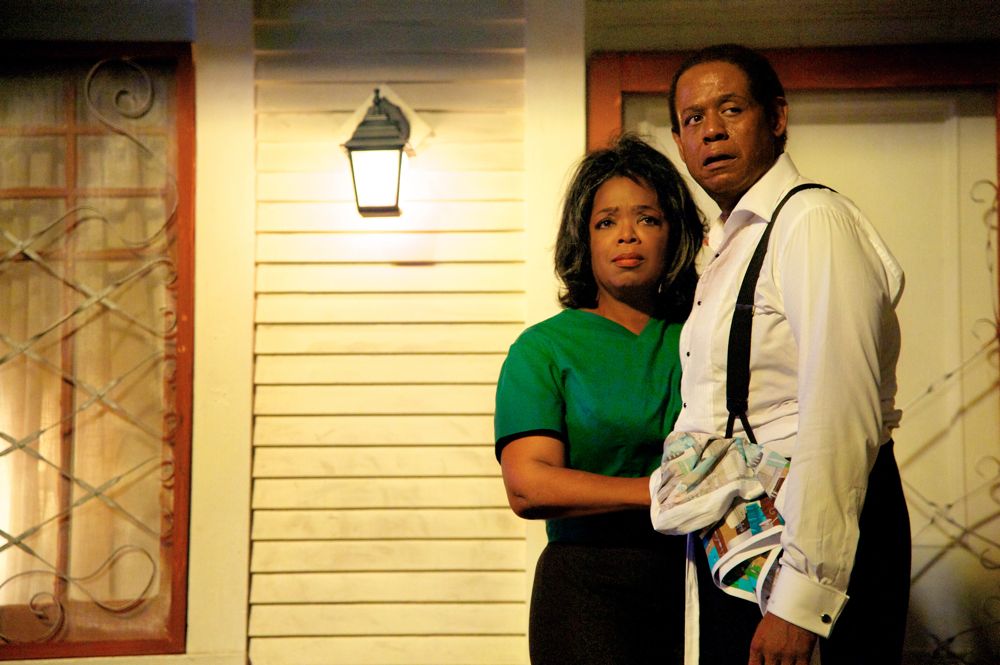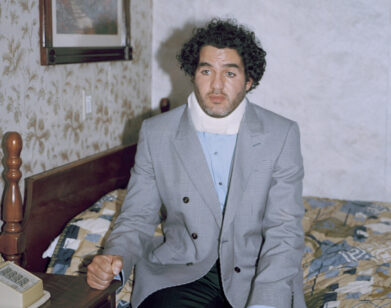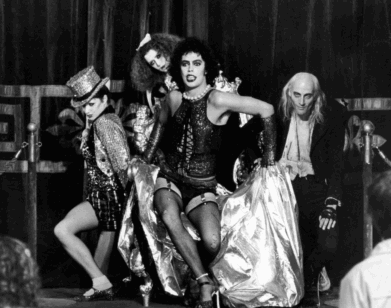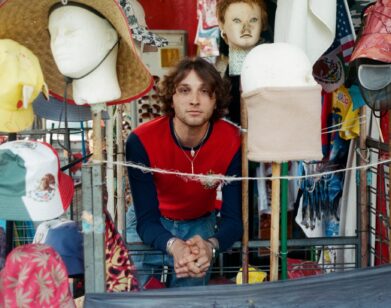Danny’s Strong Suit

ABOVE: OPRAH WINFREY AND FOREST WHITAKER IN LEE DANIEL’S THE BUTLER. PHOTO COURTESY OF THE WEINSTEIN COMPANY.
Oprah Winfrey, Forest Whitaker, Lenny Kravitz, David Oyelowo, Cuba Gooding Jr., Robin Williams, John Cusack, Liev Schreiber, Alan Rickman, Vanessa Redgrave, Jane Fonda, Alex Pettyfer, Mariah Carey, Terrence Howard—everyone has their 15 minutes of fame in Lee Daniel’s The Butler. Anchored around the life of the fictional White House butler Cecil Gaines, the ambitious film is a crash course in post-World War II American history. Gaines is loosely based on Eugene Allen, who worked at the White House for over 30 years (or eight presidents). The script comes from Danny Strong, Hollywood’s new favorite screenwriter.
As an actor, Strong’s career was unremarkable. For the first 14 years of his career, Strong was best known as Jonathan Levinson—the geeky, picked-on classmate of Buffy Summers in Joss Whedon’s cult television series Buffy the Vampire Slayer. Strong’s role was not a large one, but he’d sporadically pop up in every season and eventually got his own arc as a villain. Then, Strong wrote a screenplay about the 2000 Presidential election called Recount. HBO picked up the script and cast salivation-inducing names such as Kevin Spacey and Laura Dern. His next script about the search for a Republican Vice Presidential candidate, Game Change, cemented Hollywood’s new perception of Strong: a rare writer whose work appeals to both film enthusiasts and the box office funding masses. After The Butler, Strong was picked to write the second and third Hunger Games films.
EMMA BROWN: Eugene Allen’s life story is so great. Why fictionalize it at all?
DANNY STRONG: I started interviewing so many different butlers and other people that worked at the White House and started reading memoirs by people that worked at the White House, there were so many amazing stories that it felt like to just tell one of them would be a disservice to the universal truth of what this experience was like. I felt like it did two things: One, it was going to be better, more dynamic, and entertaining. Two, it felt like a more truthful way to tell the story. People that work at the White House, they stay forever and love the job. Someone asked me, “Was there really a butler that was there for 40 years?” I said, “No, they’re all there for 40 years.”
BROWN: Are you political?
STRONG: I am. I’m very political.
BROWN: Does that make it easier or more difficult to write political films?
STRONG: Oh, easier. Because I read politics every day, so I’m familiar with the world. I guess the next question is, is it difficult to prevent my own politics from imbuing into the film? It seemed like sort of the subtext of the question. The answer is no, it’s not difficult at all. How I approach the films is I’m trying to write what is true, so that supersedes partisan spin, in my opinion. I find partisanship is a thing for cable news and newspaper articles, but it’s not interesting for art. I think we all believe what we believe, and I don’t think a film is going to change someone’s mind. So the goal isn’t to change someone’s mind. In movies that tackle these issues, there are far more interesting themes to be explored than partisan politics, which is what we get on cable news every second of every day.
BROWN: If it is not to change anyone’s opinion or perception, what is the goal of a film like Game Change?
STRONG: In the case of Game Change, the discussion in that film was how our politicians have become so much like celebrities—personality becomes more important than substance so that they can function in a 24-hour news cycle. So the question is, how do you feel about that? Is this what you want from a politician—somebody who’s wildly charismatic, but has so little knowledge of substantive issues? I actually felt like that film had an impact on the 2012 election when it came time for Mitt Romney to pick his VP. There was article after article from the Republican camp that said we’re going to pick someone of substance; we’re going to pick a solid choice. It was not too long after the film came out, and I felt like they were responding maybe not just to the film, but also to the choice of Sarah Palin in the first place. [Romney] picked a brilliant policy wonk. I mean, literally the polar opposite of the Sarah Palin choice.
BROWN: There are a couple of Presidents missing from the movie, namely Jimmy Carter and Gerald Ford.
STRONG: Jimmy Carter was in the script for a long time, but we never shot the Jimmy Carter scenes. Part of the problem with Gerald Ford and Jimmy Carter was it was just too many presidents for the movie—the story couldn’t hold it. It was hard enough as it was, having that many presidents and having to start over every 10 or 15 minutes with a new president. In the script stage, when you read it with the Carter sequence, it was just too much. There also wasn’t a seminal civil rights event that I could hang a sequence on the way I could with other sequences. There were a few things that I could’ve used—maybe the Boston busing situation. It felt like we were jamming to get Carter in as opposed to feeling like an organic expression of the story.
BROWN: Did you ever cast anyone, or did it not get that far?
STRONG: It didn’t get that far.
BROWN: When did you start writing scripts?
STRONG: I started writing when I was 26, so I don’t even know what year that was. I wrote a script for me to star in. A friend of mine, who was an actor that I would compete against a lot, had written a script and was taking all these meetings. I was just brimming with jealousy, because here I was at my auditions and he was meeting with studio executives and producers and he very much encouraged me to start writing. He just kept pushing me and was like, “You got to do it. You’re going to love it!” He’s a very successful screenwriter now. His name is Michael Bacall and he wrote 21 Jump Street, Project X, and Scott Pilgrim vs. the World. So it was a few factors.
BROWN: Are you going to continue to act?
STRONG: Well, screenwriting is definitely the majority of my time, but I do still act when stuff comes up. I do a few jobs a year.
BROWN: Because you haven’t yet written something for yourself to star in. When’s that going to happen?
STRONG: I haven’t yet, I don’t know. People ask me that all the time, and it’s strange. I just approach it as two separate careers.
BROWN: When you sent out your first script, were you worried that people wouldn’t take you seriously as a writer if they knew you were an actor?
STRONG: I don’t even know if people are familiar with my name as an actor. It’s not as if I ever was an über-famous actor.
BROWN: I knew your name.
STRONG: Thank you! I find that when people get a script, they know within five pages if the writer can write. Once you’re five pages in, it doesn’t matter whose name is on the cover, you’re not even thinking about it.
BROWN: When you’re writing, do write with actors in mind? Or do you just play every role yourself?
STRONG: As I’m writing it, yeah. As I’m writing it, I’m playing every part. I was always worried that it was a little weird and then I read an interview with Aaron Sorkin and he said he plays every part when he’s writing. I thought, “Oh, I do that too! I’m doing okay.”
BROWN: Oprah has a large part in the film, and Mariah Carey makes a cameo appearance. Do you ever worry that the primary careers of these celebrities will overshadow their performance?
STRONG: Yeah, I was definitely worried that there were just too many famous people in the movie and that the audience wouldn’t be able to get lost in the story. I was amazed how that wasn’t the case when I saw the first cut. I think it’s a real testament to Lee Daniels’ direction and these performances.
BROWN: So you have some high-profile scripts coming up. When did people start approaching you to do things like The Butler and Hunger Games?
STRONG: Things really changed after the script for Recount. That script hit the town on Thursday and by Monday, my life had changed. The writing career had completely changed long before the film came out because there was this bizarre weekend—”Sam Mendes says he thinks he’s going to direct Recount and Spielberg and Oliver Stone are going to read it over the weekend.” Then Monday came and my phone exploded. Ever since then, I’ve been fortunate to be in on a really neat mix of assignments.
BROWN: Obviously, that wasn’t your first screenplay. How far were you into writing screenplays?
STRONG: I had written four scripts before I wrote Recount. Each one progressed my career a little bit, but I didn’t make a dime off any of them. Recount was the first thing I sold, and I actually sold it as a pitch to HBO. They bought it as a pitch, which was a miracle. I thought, “Wow, this could be the last time I’ll be paid to write a script again, which would be too bad because that was an amazing experience I just had.” Then about five weeks later, that crazy weekend happened.
BROWN: Now that you’re a big name in screenwriting, do people go back and read those scripts?
STRONG: No, I didn’t put them out there because they’re not that good. They’re not nearly at the level of post-Recount writing.
BROWN: Do you get most recognized for your screenwriting now?
STRONG: No, still television. Buffy is 70 percent, Gilmore Girls is 30 percent, and then Mad Men.
BROWN: Do you know where your fans are from before they even come up to you?
STRONG: Sometimes. I can definitely tell. By dress and demeanor. If it’s a mother/daughter, it’s definitely Gilmore Girls. They usually say, “We always watch it together, and we feel like we’re the Gilmore girls.” I’ve heard that like, 5,000 times.
BROWN: What’s the most common comment you get about Buffy?
STRONG: I don’t know if there’s one specific thing that I get over and over again. The show feels like it’s gotten bigger since it’s been off the air. It became a whole new thing when people watched with DVD and now with Netflix and streaming…
BROWN: And Joss Whedon’s profile just skyrocketed. Do you still keep up with him?
STRONG: Not so much with Joss. I keep in touch with Amy Sherman-Palladino and her husband, Dan Palladino. They’re kind of like aunt/uncle figures to me, and I’m really fond of them.
BROWN: What was the hardest scene to write in The Butler?
STRONG: Usually if a scene’s really hard to write, I just don’t write it. Nothing’s coming to mind.
BROWN: When you agreed to do the movie, where was the first place you went to start your research?
STRONG: I went to a bookstore before I even agreed to do the movie when I was trying to figure out how I was going to do it. I went to a bookstore and just grabbed some books on civil rights that were on the shelves and just started reading these stories.
BROWN: Did you get a sense of, “This historian is the one I’m going to read from now on”?
STRONG: No, there were so many books I read for this—so many sources.
BROWN: Since you’ve become a screenwriter, is there one movie maybe you liked before, but now you’re like, “Wow, that was an awesome screenplay”?
STRONG: Empire of the Sun. Did you ever see that movie?
BROWN: With mini Christian Bale? Yes, I did.
STRONG: Yeah, little Christian Bale. It was one of my favorite movies as a kid, and I re-watched it not too long ago, and my jaw just hit the floor. The whole time I was like, “Who wrote this? This is unbelievable.” And then the credits came up at the end and it was Tom Stoppard, my favorite playwright. It’s just an amazing piece of writing.
LEE DANIEL’S THE BUTLER COMES OUT TOMORROW, AUGUST 16.






